BSC Business Environment: Economic Policy & UK Impact - BMP4003
VerifiedAdded on 2023/06/05
|7
|2918
|239
Exam
AI Summary
This document presents a solution to a Business Environment exam, covering key topics such as the impact of the Monetary Policy Committee on inflation, the effectiveness of fiscal policy, the effects of decreasing interest rates, types and measurement of unemployment, and the stages of the economic cycle. It also analyzes the impact of the coronavirus pandemic on the UK economy, including its effects on GDP, various industries, and unemployment rates. The solution further discusses sustainable economic growth and factors influencing economic development, highlighting the importance of managing resources for future generations. Desklib is a platform where students can find similar solved assignments and study resources.
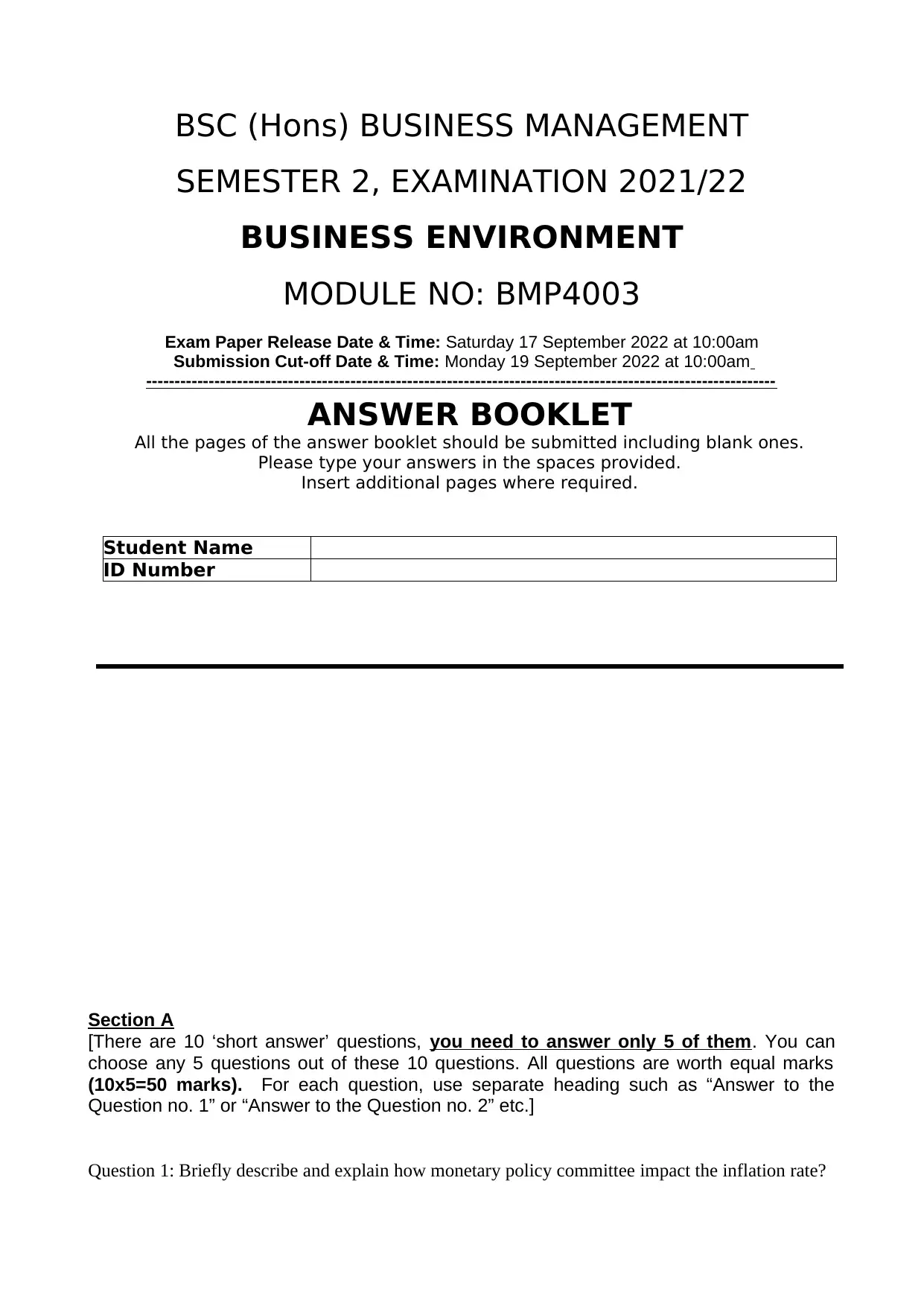
BSC (Hons) BUSINESS MANAGEMENT
SEMESTER 2, EXAMINATION 2021/22
BUSINESS ENVIRONMENT
MODULE NO: BMP4003
Exam Paper Release Date & Time: Saturday 17 September 2022 at 10:00am
Submission Cut-off Date & Time: Monday 19 September 2022 at 10:00am
---------------------------------------------------------------------------------------------------------------
ANSWER BOOKLET
All the pages of the answer booklet should be submitted including blank ones.
Please type your answers in the spaces provided.
Insert additional pages where required.
Student Name
ID Number
Section A
[There are 10 ‘short answer’ questions, you need to answer only 5 of them. You can
choose any 5 questions out of these 10 questions. All questions are worth equal marks
(10x5=50 marks). For each question, use separate heading such as “Answer to the
Question no. 1” or “Answer to the Question no. 2” etc.]
Question 1: Briefly describe and explain how monetary policy committee impact the inflation rate?
SEMESTER 2, EXAMINATION 2021/22
BUSINESS ENVIRONMENT
MODULE NO: BMP4003
Exam Paper Release Date & Time: Saturday 17 September 2022 at 10:00am
Submission Cut-off Date & Time: Monday 19 September 2022 at 10:00am
---------------------------------------------------------------------------------------------------------------
ANSWER BOOKLET
All the pages of the answer booklet should be submitted including blank ones.
Please type your answers in the spaces provided.
Insert additional pages where required.
Student Name
ID Number
Section A
[There are 10 ‘short answer’ questions, you need to answer only 5 of them. You can
choose any 5 questions out of these 10 questions. All questions are worth equal marks
(10x5=50 marks). For each question, use separate heading such as “Answer to the
Question no. 1” or “Answer to the Question no. 2” etc.]
Question 1: Briefly describe and explain how monetary policy committee impact the inflation rate?
Paraphrase This Document
Need a fresh take? Get an instant paraphrase of this document with our AI Paraphraser
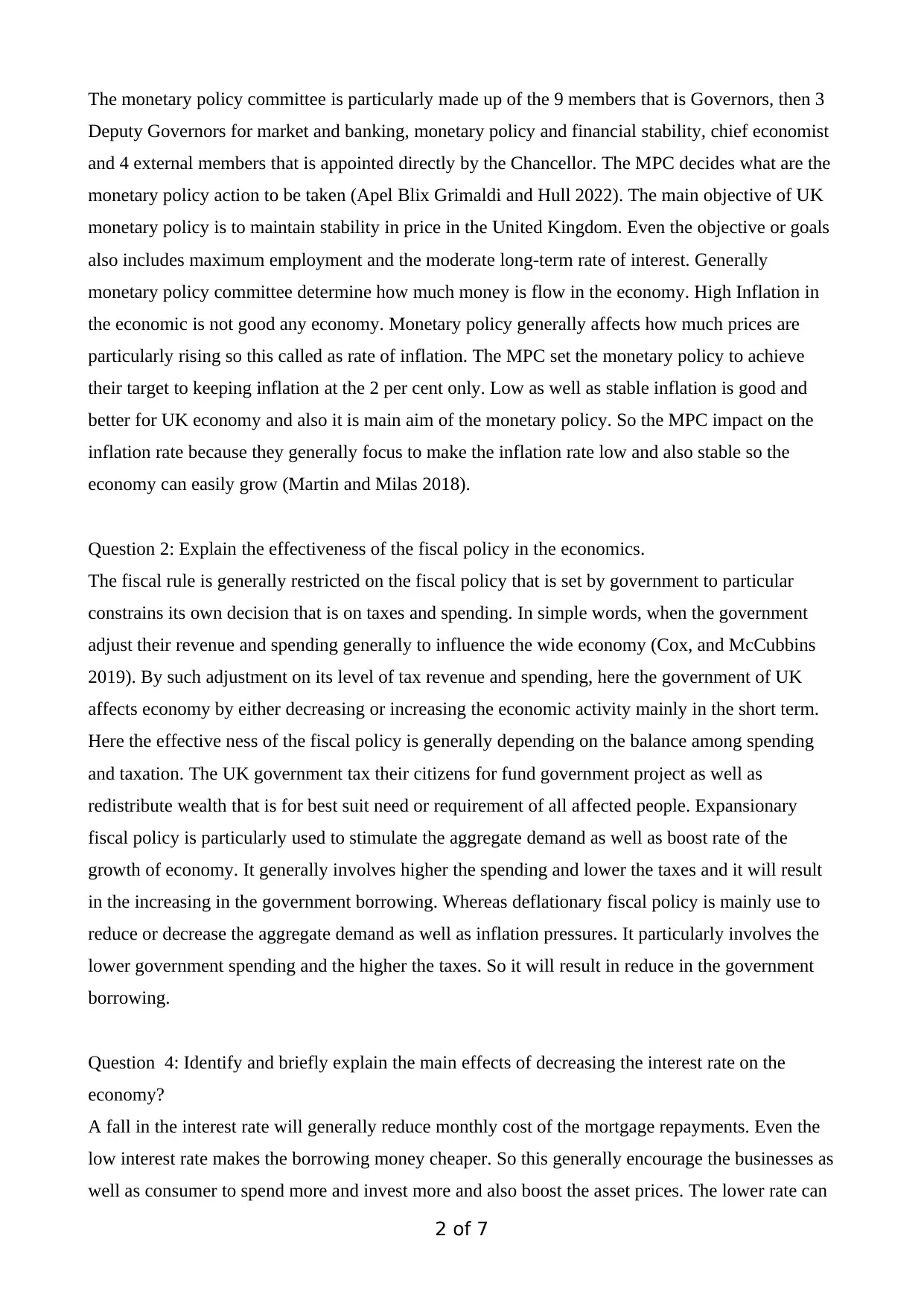
The monetary policy committee is particularly made up of the 9 members that is Governors, then 3
Deputy Governors for market and banking, monetary policy and financial stability, chief economist
and 4 external members that is appointed directly by the Chancellor. The MPC decides what are the
monetary policy action to be taken (Apel Blix Grimaldi and Hull 2022). The main objective of UK
monetary policy is to maintain stability in price in the United Kingdom. Even the objective or goals
also includes maximum employment and the moderate long-term rate of interest. Generally
monetary policy committee determine how much money is flow in the economy. High Inflation in
the economic is not good any economy. Monetary policy generally affects how much prices are
particularly rising so this called as rate of inflation. The MPC set the monetary policy to achieve
their target to keeping inflation at the 2 per cent only. Low as well as stable inflation is good and
better for UK economy and also it is main aim of the monetary policy. So the MPC impact on the
inflation rate because they generally focus to make the inflation rate low and also stable so the
economy can easily grow (Martin and Milas 2018).
Question 2: Explain the effectiveness of the fiscal policy in the economics.
The fiscal rule is generally restricted on the fiscal policy that is set by government to particular
constrains its own decision that is on taxes and spending. In simple words, when the government
adjust their revenue and spending generally to influence the wide economy (Cox, and McCubbins
2019). By such adjustment on its level of tax revenue and spending, here the government of UK
affects economy by either decreasing or increasing the economic activity mainly in the short term.
Here the effective ness of the fiscal policy is generally depending on the balance among spending
and taxation. The UK government tax their citizens for fund government project as well as
redistribute wealth that is for best suit need or requirement of all affected people. Expansionary
fiscal policy is particularly used to stimulate the aggregate demand as well as boost rate of the
growth of economy. It generally involves higher the spending and lower the taxes and it will result
in the increasing in the government borrowing. Whereas deflationary fiscal policy is mainly use to
reduce or decrease the aggregate demand as well as inflation pressures. It particularly involves the
lower government spending and the higher the taxes. So it will result in reduce in the government
borrowing.
Question 4: Identify and briefly explain the main effects of decreasing the interest rate on the
economy?
A fall in the interest rate will generally reduce monthly cost of the mortgage repayments. Even the
low interest rate makes the borrowing money cheaper. So this generally encourage the businesses as
well as consumer to spend more and invest more and also boost the asset prices. The lower rate can
2 of 7
Deputy Governors for market and banking, monetary policy and financial stability, chief economist
and 4 external members that is appointed directly by the Chancellor. The MPC decides what are the
monetary policy action to be taken (Apel Blix Grimaldi and Hull 2022). The main objective of UK
monetary policy is to maintain stability in price in the United Kingdom. Even the objective or goals
also includes maximum employment and the moderate long-term rate of interest. Generally
monetary policy committee determine how much money is flow in the economy. High Inflation in
the economic is not good any economy. Monetary policy generally affects how much prices are
particularly rising so this called as rate of inflation. The MPC set the monetary policy to achieve
their target to keeping inflation at the 2 per cent only. Low as well as stable inflation is good and
better for UK economy and also it is main aim of the monetary policy. So the MPC impact on the
inflation rate because they generally focus to make the inflation rate low and also stable so the
economy can easily grow (Martin and Milas 2018).
Question 2: Explain the effectiveness of the fiscal policy in the economics.
The fiscal rule is generally restricted on the fiscal policy that is set by government to particular
constrains its own decision that is on taxes and spending. In simple words, when the government
adjust their revenue and spending generally to influence the wide economy (Cox, and McCubbins
2019). By such adjustment on its level of tax revenue and spending, here the government of UK
affects economy by either decreasing or increasing the economic activity mainly in the short term.
Here the effective ness of the fiscal policy is generally depending on the balance among spending
and taxation. The UK government tax their citizens for fund government project as well as
redistribute wealth that is for best suit need or requirement of all affected people. Expansionary
fiscal policy is particularly used to stimulate the aggregate demand as well as boost rate of the
growth of economy. It generally involves higher the spending and lower the taxes and it will result
in the increasing in the government borrowing. Whereas deflationary fiscal policy is mainly use to
reduce or decrease the aggregate demand as well as inflation pressures. It particularly involves the
lower government spending and the higher the taxes. So it will result in reduce in the government
borrowing.
Question 4: Identify and briefly explain the main effects of decreasing the interest rate on the
economy?
A fall in the interest rate will generally reduce monthly cost of the mortgage repayments. Even the
low interest rate makes the borrowing money cheaper. So this generally encourage the businesses as
well as consumer to spend more and invest more and also boost the asset prices. The lower rate can
2 of 7
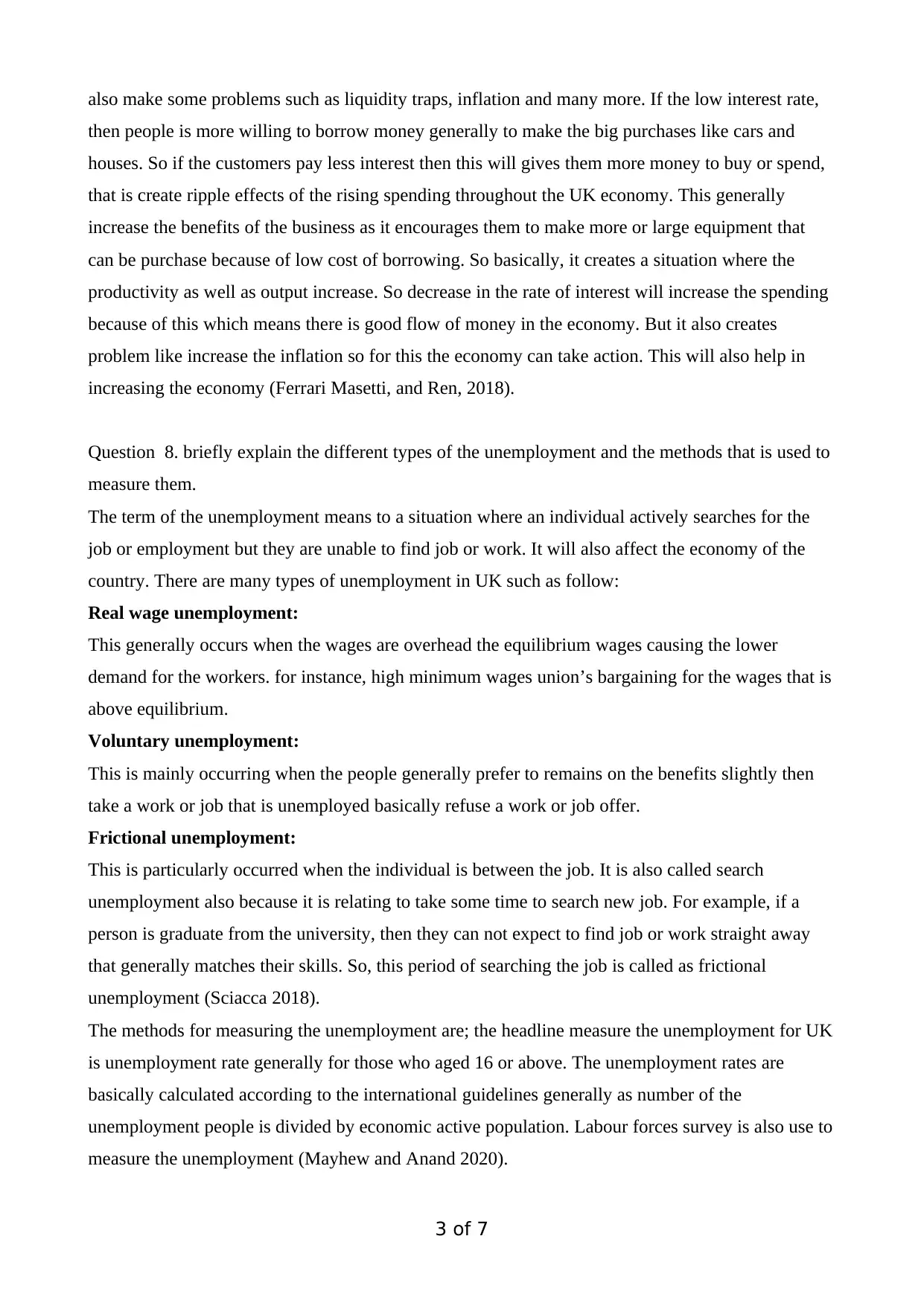
also make some problems such as liquidity traps, inflation and many more. If the low interest rate,
then people is more willing to borrow money generally to make the big purchases like cars and
houses. So if the customers pay less interest then this will gives them more money to buy or spend,
that is create ripple effects of the rising spending throughout the UK economy. This generally
increase the benefits of the business as it encourages them to make more or large equipment that
can be purchase because of low cost of borrowing. So basically, it creates a situation where the
productivity as well as output increase. So decrease in the rate of interest will increase the spending
because of this which means there is good flow of money in the economy. But it also creates
problem like increase the inflation so for this the economy can take action. This will also help in
increasing the economy (Ferrari Masetti, and Ren, 2018).
Question 8. briefly explain the different types of the unemployment and the methods that is used to
measure them.
The term of the unemployment means to a situation where an individual actively searches for the
job or employment but they are unable to find job or work. It will also affect the economy of the
country. There are many types of unemployment in UK such as follow:
Real wage unemployment:
This generally occurs when the wages are overhead the equilibrium wages causing the lower
demand for the workers. for instance, high minimum wages union’s bargaining for the wages that is
above equilibrium.
Voluntary unemployment:
This is mainly occurring when the people generally prefer to remains on the benefits slightly then
take a work or job that is unemployed basically refuse a work or job offer.
Frictional unemployment:
This is particularly occurred when the individual is between the job. It is also called search
unemployment also because it is relating to take some time to search new job. For example, if a
person is graduate from the university, then they can not expect to find job or work straight away
that generally matches their skills. So, this period of searching the job is called as frictional
unemployment (Sciacca 2018).
The methods for measuring the unemployment are; the headline measure the unemployment for UK
is unemployment rate generally for those who aged 16 or above. The unemployment rates are
basically calculated according to the international guidelines generally as number of the
unemployment people is divided by economic active population. Labour forces survey is also use to
measure the unemployment (Mayhew and Anand 2020).
3 of 7
then people is more willing to borrow money generally to make the big purchases like cars and
houses. So if the customers pay less interest then this will gives them more money to buy or spend,
that is create ripple effects of the rising spending throughout the UK economy. This generally
increase the benefits of the business as it encourages them to make more or large equipment that
can be purchase because of low cost of borrowing. So basically, it creates a situation where the
productivity as well as output increase. So decrease in the rate of interest will increase the spending
because of this which means there is good flow of money in the economy. But it also creates
problem like increase the inflation so for this the economy can take action. This will also help in
increasing the economy (Ferrari Masetti, and Ren, 2018).
Question 8. briefly explain the different types of the unemployment and the methods that is used to
measure them.
The term of the unemployment means to a situation where an individual actively searches for the
job or employment but they are unable to find job or work. It will also affect the economy of the
country. There are many types of unemployment in UK such as follow:
Real wage unemployment:
This generally occurs when the wages are overhead the equilibrium wages causing the lower
demand for the workers. for instance, high minimum wages union’s bargaining for the wages that is
above equilibrium.
Voluntary unemployment:
This is mainly occurring when the people generally prefer to remains on the benefits slightly then
take a work or job that is unemployed basically refuse a work or job offer.
Frictional unemployment:
This is particularly occurred when the individual is between the job. It is also called search
unemployment also because it is relating to take some time to search new job. For example, if a
person is graduate from the university, then they can not expect to find job or work straight away
that generally matches their skills. So, this period of searching the job is called as frictional
unemployment (Sciacca 2018).
The methods for measuring the unemployment are; the headline measure the unemployment for UK
is unemployment rate generally for those who aged 16 or above. The unemployment rates are
basically calculated according to the international guidelines generally as number of the
unemployment people is divided by economic active population. Labour forces survey is also use to
measure the unemployment (Mayhew and Anand 2020).
3 of 7
⊘ This is a preview!⊘
Do you want full access?
Subscribe today to unlock all pages.

Trusted by 1+ million students worldwide
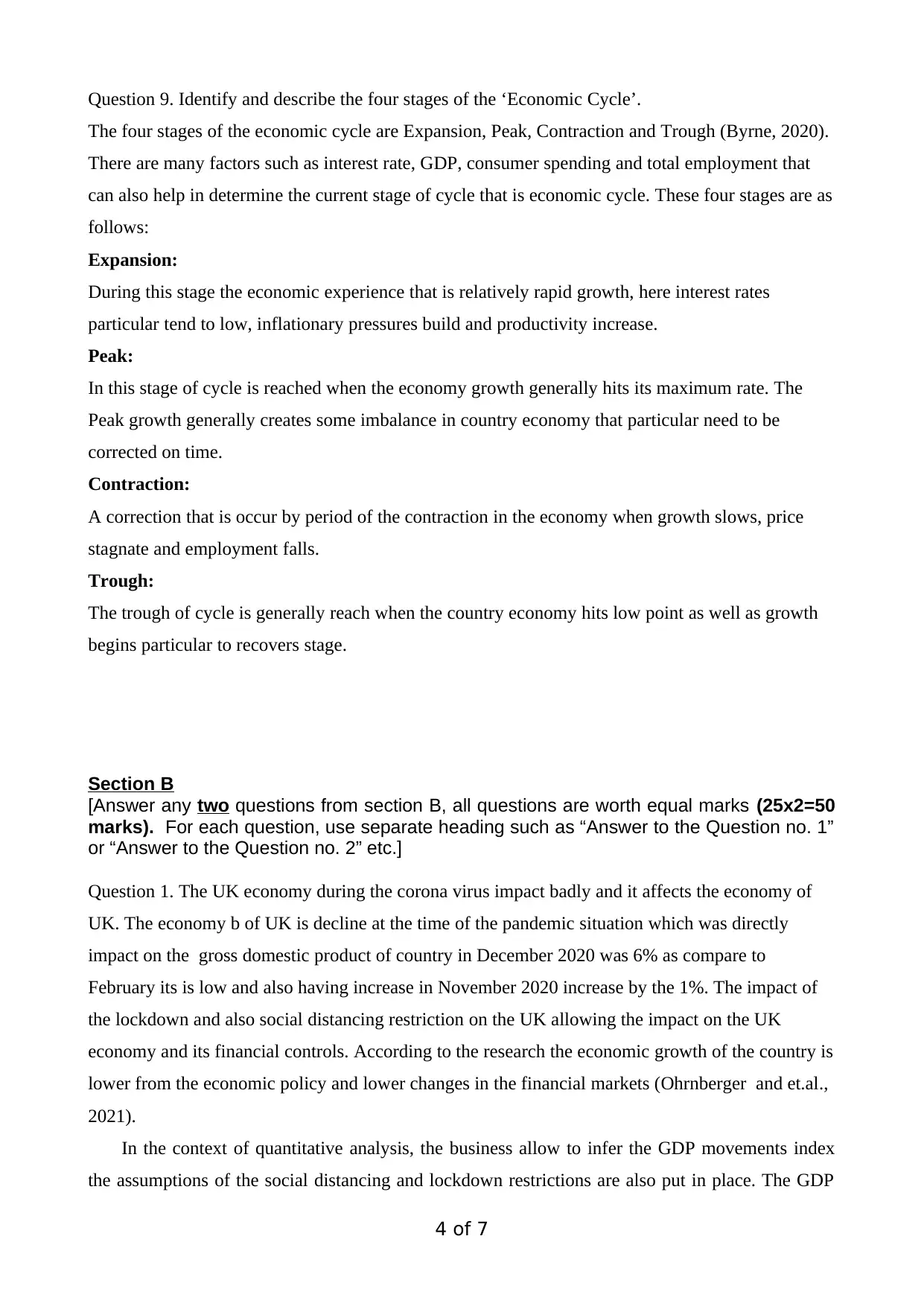
Question 9. Identify and describe the four stages of the ‘Economic Cycle’.
The four stages of the economic cycle are Expansion, Peak, Contraction and Trough (Byrne, 2020).
There are many factors such as interest rate, GDP, consumer spending and total employment that
can also help in determine the current stage of cycle that is economic cycle. These four stages are as
follows:
Expansion:
During this stage the economic experience that is relatively rapid growth, here interest rates
particular tend to low, inflationary pressures build and productivity increase.
Peak:
In this stage of cycle is reached when the economy growth generally hits its maximum rate. The
Peak growth generally creates some imbalance in country economy that particular need to be
corrected on time.
Contraction:
A correction that is occur by period of the contraction in the economy when growth slows, price
stagnate and employment falls.
Trough:
The trough of cycle is generally reach when the country economy hits low point as well as growth
begins particular to recovers stage.
Section B
[Answer any two questions from section B, all questions are worth equal marks (25x2=50
marks). For each question, use separate heading such as “Answer to the Question no. 1”
or “Answer to the Question no. 2” etc.]
Question 1. The UK economy during the corona virus impact badly and it affects the economy of
UK. The economy b of UK is decline at the time of the pandemic situation which was directly
impact on the gross domestic product of country in December 2020 was 6% as compare to
February its is low and also having increase in November 2020 increase by the 1%. The impact of
the lockdown and also social distancing restriction on the UK allowing the impact on the UK
economy and its financial controls. According to the research the economic growth of the country is
lower from the economic policy and lower changes in the financial markets (Ohrnberger and et.al.,
2021).
In the context of quantitative analysis, the business allow to infer the GDP movements index
the assumptions of the social distancing and lockdown restrictions are also put in place. The GDP
4 of 7
The four stages of the economic cycle are Expansion, Peak, Contraction and Trough (Byrne, 2020).
There are many factors such as interest rate, GDP, consumer spending and total employment that
can also help in determine the current stage of cycle that is economic cycle. These four stages are as
follows:
Expansion:
During this stage the economic experience that is relatively rapid growth, here interest rates
particular tend to low, inflationary pressures build and productivity increase.
Peak:
In this stage of cycle is reached when the economy growth generally hits its maximum rate. The
Peak growth generally creates some imbalance in country economy that particular need to be
corrected on time.
Contraction:
A correction that is occur by period of the contraction in the economy when growth slows, price
stagnate and employment falls.
Trough:
The trough of cycle is generally reach when the country economy hits low point as well as growth
begins particular to recovers stage.
Section B
[Answer any two questions from section B, all questions are worth equal marks (25x2=50
marks). For each question, use separate heading such as “Answer to the Question no. 1”
or “Answer to the Question no. 2” etc.]
Question 1. The UK economy during the corona virus impact badly and it affects the economy of
UK. The economy b of UK is decline at the time of the pandemic situation which was directly
impact on the gross domestic product of country in December 2020 was 6% as compare to
February its is low and also having increase in November 2020 increase by the 1%. The impact of
the lockdown and also social distancing restriction on the UK allowing the impact on the UK
economy and its financial controls. According to the research the economic growth of the country is
lower from the economic policy and lower changes in the financial markets (Ohrnberger and et.al.,
2021).
In the context of quantitative analysis, the business allow to infer the GDP movements index
the assumptions of the social distancing and lockdown restrictions are also put in place. The GDP
4 of 7
Paraphrase This Document
Need a fresh take? Get an instant paraphrase of this document with our AI Paraphraser
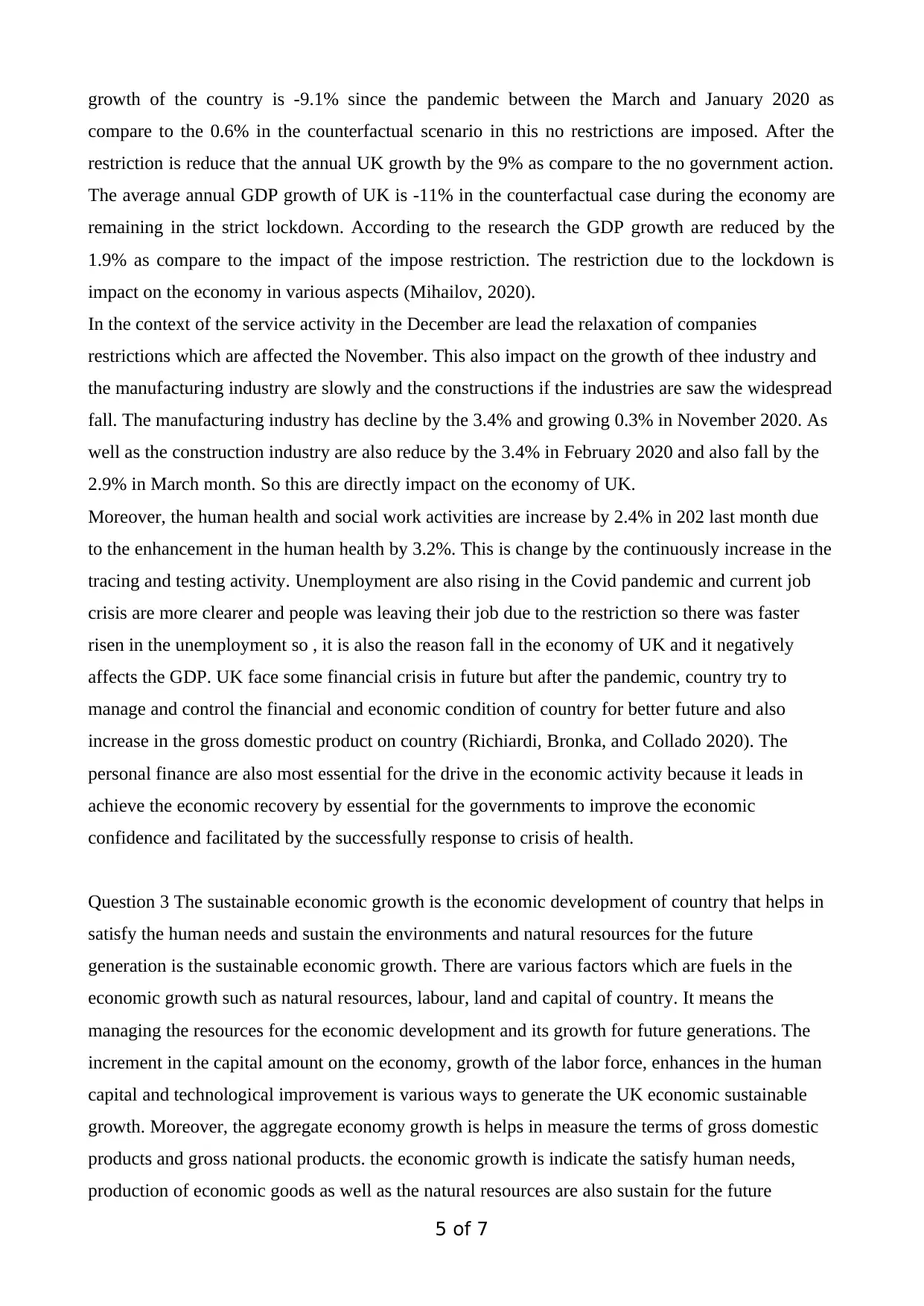
growth of the country is -9.1% since the pandemic between the March and January 2020 as
compare to the 0.6% in the counterfactual scenario in this no restrictions are imposed. After the
restriction is reduce that the annual UK growth by the 9% as compare to the no government action.
The average annual GDP growth of UK is -11% in the counterfactual case during the economy are
remaining in the strict lockdown. According to the research the GDP growth are reduced by the
1.9% as compare to the impact of the impose restriction. The restriction due to the lockdown is
impact on the economy in various aspects (Mihailov, 2020).
In the context of the service activity in the December are lead the relaxation of companies
restrictions which are affected the November. This also impact on the growth of thee industry and
the manufacturing industry are slowly and the constructions if the industries are saw the widespread
fall. The manufacturing industry has decline by the 3.4% and growing 0.3% in November 2020. As
well as the construction industry are also reduce by the 3.4% in February 2020 and also fall by the
2.9% in March month. So this are directly impact on the economy of UK.
Moreover, the human health and social work activities are increase by 2.4% in 202 last month due
to the enhancement in the human health by 3.2%. This is change by the continuously increase in the
tracing and testing activity. Unemployment are also rising in the Covid pandemic and current job
crisis are more clearer and people was leaving their job due to the restriction so there was faster
risen in the unemployment so , it is also the reason fall in the economy of UK and it negatively
affects the GDP. UK face some financial crisis in future but after the pandemic, country try to
manage and control the financial and economic condition of country for better future and also
increase in the gross domestic product on country (Richiardi, Bronka, and Collado 2020). The
personal finance are also most essential for the drive in the economic activity because it leads in
achieve the economic recovery by essential for the governments to improve the economic
confidence and facilitated by the successfully response to crisis of health.
Question 3 The sustainable economic growth is the economic development of country that helps in
satisfy the human needs and sustain the environments and natural resources for the future
generation is the sustainable economic growth. There are various factors which are fuels in the
economic growth such as natural resources, labour, land and capital of country. It means the
managing the resources for the economic development and its growth for future generations. The
increment in the capital amount on the economy, growth of the labor force, enhances in the human
capital and technological improvement is various ways to generate the UK economic sustainable
growth. Moreover, the aggregate economy growth is helps in measure the terms of gross domestic
products and gross national products. the economic growth is indicate the satisfy human needs,
production of economic goods as well as the natural resources are also sustain for the future
5 of 7
compare to the 0.6% in the counterfactual scenario in this no restrictions are imposed. After the
restriction is reduce that the annual UK growth by the 9% as compare to the no government action.
The average annual GDP growth of UK is -11% in the counterfactual case during the economy are
remaining in the strict lockdown. According to the research the GDP growth are reduced by the
1.9% as compare to the impact of the impose restriction. The restriction due to the lockdown is
impact on the economy in various aspects (Mihailov, 2020).
In the context of the service activity in the December are lead the relaxation of companies
restrictions which are affected the November. This also impact on the growth of thee industry and
the manufacturing industry are slowly and the constructions if the industries are saw the widespread
fall. The manufacturing industry has decline by the 3.4% and growing 0.3% in November 2020. As
well as the construction industry are also reduce by the 3.4% in February 2020 and also fall by the
2.9% in March month. So this are directly impact on the economy of UK.
Moreover, the human health and social work activities are increase by 2.4% in 202 last month due
to the enhancement in the human health by 3.2%. This is change by the continuously increase in the
tracing and testing activity. Unemployment are also rising in the Covid pandemic and current job
crisis are more clearer and people was leaving their job due to the restriction so there was faster
risen in the unemployment so , it is also the reason fall in the economy of UK and it negatively
affects the GDP. UK face some financial crisis in future but after the pandemic, country try to
manage and control the financial and economic condition of country for better future and also
increase in the gross domestic product on country (Richiardi, Bronka, and Collado 2020). The
personal finance are also most essential for the drive in the economic activity because it leads in
achieve the economic recovery by essential for the governments to improve the economic
confidence and facilitated by the successfully response to crisis of health.
Question 3 The sustainable economic growth is the economic development of country that helps in
satisfy the human needs and sustain the environments and natural resources for the future
generation is the sustainable economic growth. There are various factors which are fuels in the
economic growth such as natural resources, labour, land and capital of country. It means the
managing the resources for the economic development and its growth for future generations. The
increment in the capital amount on the economy, growth of the labor force, enhances in the human
capital and technological improvement is various ways to generate the UK economic sustainable
growth. Moreover, the aggregate economy growth is helps in measure the terms of gross domestic
products and gross national products. the economic growth is indicate the satisfy human needs,
production of economic goods as well as the natural resources are also sustain for the future
5 of 7
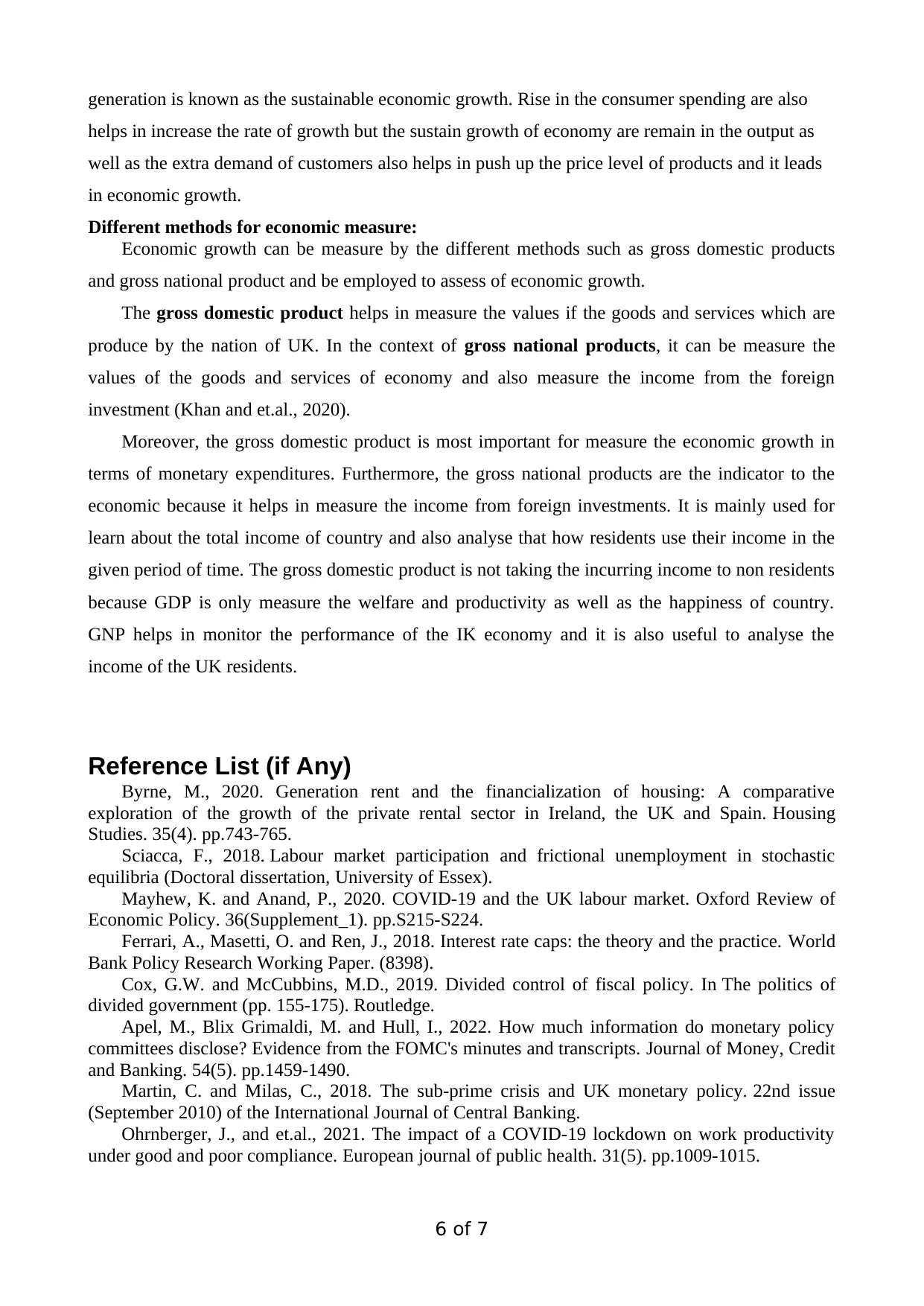
generation is known as the sustainable economic growth. Rise in the consumer spending are also
helps in increase the rate of growth but the sustain growth of economy are remain in the output as
well as the extra demand of customers also helps in push up the price level of products and it leads
in economic growth.
Different methods for economic measure:
Economic growth can be measure by the different methods such as gross domestic products
and gross national product and be employed to assess of economic growth.
The gross domestic product helps in measure the values if the goods and services which are
produce by the nation of UK. In the context of gross national products, it can be measure the
values of the goods and services of economy and also measure the income from the foreign
investment (Khan and et.al., 2020).
Moreover, the gross domestic product is most important for measure the economic growth in
terms of monetary expenditures. Furthermore, the gross national products are the indicator to the
economic because it helps in measure the income from foreign investments. It is mainly used for
learn about the total income of country and also analyse that how residents use their income in the
given period of time. The gross domestic product is not taking the incurring income to non residents
because GDP is only measure the welfare and productivity as well as the happiness of country.
GNP helps in monitor the performance of the IK economy and it is also useful to analyse the
income of the UK residents.
Reference List (if Any)
Byrne, M., 2020. Generation rent and the financialization of housing: A comparative
exploration of the growth of the private rental sector in Ireland, the UK and Spain. Housing
Studies. 35(4). pp.743-765.
Sciacca, F., 2018. Labour market participation and frictional unemployment in stochastic
equilibria (Doctoral dissertation, University of Essex).
Mayhew, K. and Anand, P., 2020. COVID-19 and the UK labour market. Oxford Review of
Economic Policy. 36(Supplement_1). pp.S215-S224.
Ferrari, A., Masetti, O. and Ren, J., 2018. Interest rate caps: the theory and the practice. World
Bank Policy Research Working Paper. (8398).
Cox, G.W. and McCubbins, M.D., 2019. Divided control of fiscal policy. In The politics of
divided government (pp. 155-175). Routledge.
Apel, M., Blix Grimaldi, M. and Hull, I., 2022. How much information do monetary policy
committees disclose? Evidence from the FOMC's minutes and transcripts. Journal of Money, Credit
and Banking. 54(5). pp.1459-1490.
Martin, C. and Milas, C., 2018. The sub-prime crisis and UK monetary policy. 22nd issue
(September 2010) of the International Journal of Central Banking.
Ohrnberger, J., and et.al., 2021. The impact of a COVID-19 lockdown on work productivity
under good and poor compliance. European journal of public health. 31(5). pp.1009-1015.
6 of 7
helps in increase the rate of growth but the sustain growth of economy are remain in the output as
well as the extra demand of customers also helps in push up the price level of products and it leads
in economic growth.
Different methods for economic measure:
Economic growth can be measure by the different methods such as gross domestic products
and gross national product and be employed to assess of economic growth.
The gross domestic product helps in measure the values if the goods and services which are
produce by the nation of UK. In the context of gross national products, it can be measure the
values of the goods and services of economy and also measure the income from the foreign
investment (Khan and et.al., 2020).
Moreover, the gross domestic product is most important for measure the economic growth in
terms of monetary expenditures. Furthermore, the gross national products are the indicator to the
economic because it helps in measure the income from foreign investments. It is mainly used for
learn about the total income of country and also analyse that how residents use their income in the
given period of time. The gross domestic product is not taking the incurring income to non residents
because GDP is only measure the welfare and productivity as well as the happiness of country.
GNP helps in monitor the performance of the IK economy and it is also useful to analyse the
income of the UK residents.
Reference List (if Any)
Byrne, M., 2020. Generation rent and the financialization of housing: A comparative
exploration of the growth of the private rental sector in Ireland, the UK and Spain. Housing
Studies. 35(4). pp.743-765.
Sciacca, F., 2018. Labour market participation and frictional unemployment in stochastic
equilibria (Doctoral dissertation, University of Essex).
Mayhew, K. and Anand, P., 2020. COVID-19 and the UK labour market. Oxford Review of
Economic Policy. 36(Supplement_1). pp.S215-S224.
Ferrari, A., Masetti, O. and Ren, J., 2018. Interest rate caps: the theory and the practice. World
Bank Policy Research Working Paper. (8398).
Cox, G.W. and McCubbins, M.D., 2019. Divided control of fiscal policy. In The politics of
divided government (pp. 155-175). Routledge.
Apel, M., Blix Grimaldi, M. and Hull, I., 2022. How much information do monetary policy
committees disclose? Evidence from the FOMC's minutes and transcripts. Journal of Money, Credit
and Banking. 54(5). pp.1459-1490.
Martin, C. and Milas, C., 2018. The sub-prime crisis and UK monetary policy. 22nd issue
(September 2010) of the International Journal of Central Banking.
Ohrnberger, J., and et.al., 2021. The impact of a COVID-19 lockdown on work productivity
under good and poor compliance. European journal of public health. 31(5). pp.1009-1015.
6 of 7
⊘ This is a preview!⊘
Do you want full access?
Subscribe today to unlock all pages.

Trusted by 1+ million students worldwide
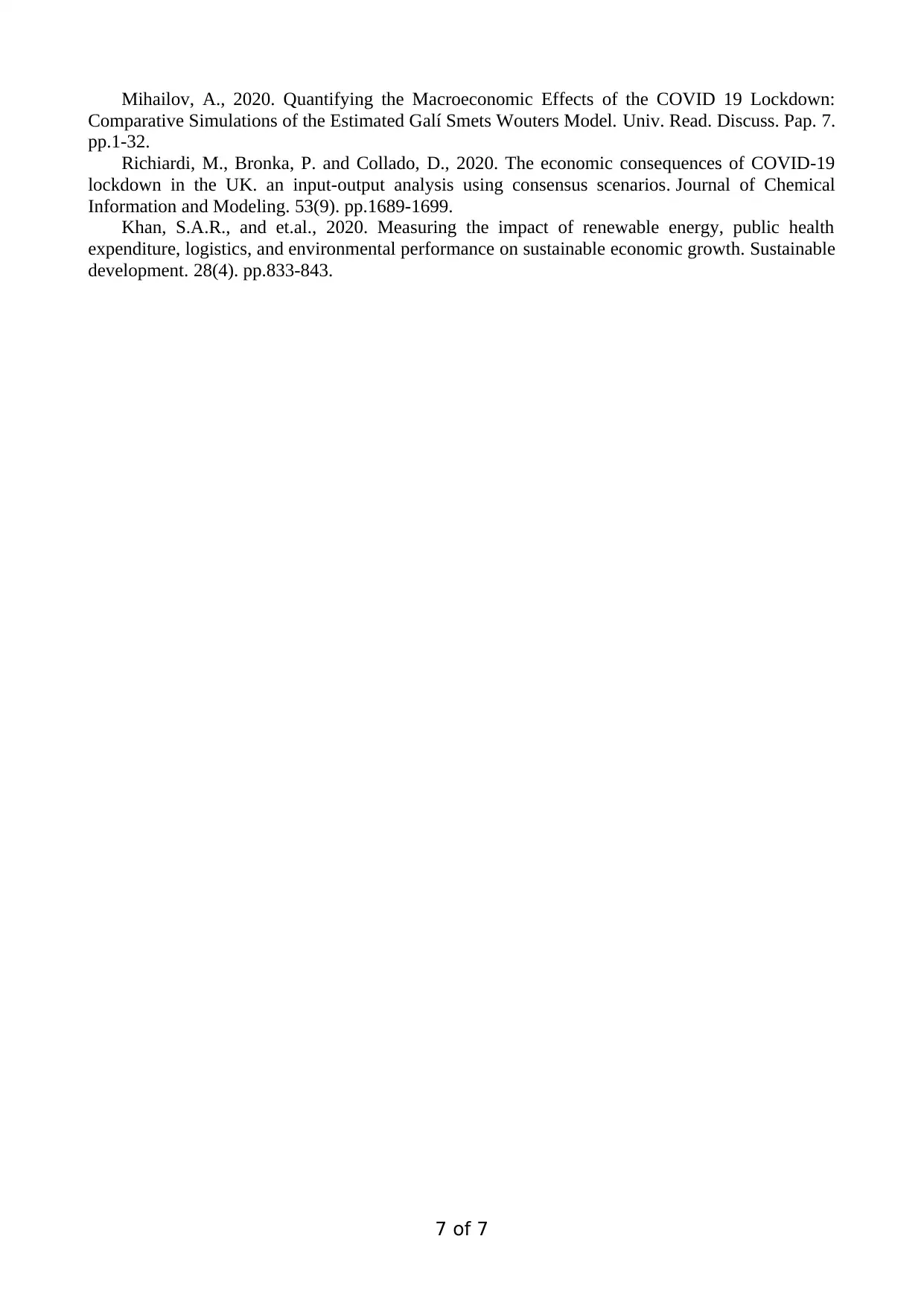
Mihailov, A., 2020. Quantifying the Macroeconomic Effects of the COVID 19 Lockdown:
Comparative Simulations of the Estimated Galí Smets Wouters Model. Univ. Read. Discuss. Pap. 7.
pp.1-32.
Richiardi, M., Bronka, P. and Collado, D., 2020. The economic consequences of COVID-19
lockdown in the UK. an input-output analysis using consensus scenarios. Journal of Chemical
Information and Modeling. 53(9). pp.1689-1699.
Khan, S.A.R., and et.al., 2020. Measuring the impact of renewable energy, public health
expenditure, logistics, and environmental performance on sustainable economic growth. Sustainable
development. 28(4). pp.833-843.
7 of 7
Comparative Simulations of the Estimated Galí Smets Wouters Model. Univ. Read. Discuss. Pap. 7.
pp.1-32.
Richiardi, M., Bronka, P. and Collado, D., 2020. The economic consequences of COVID-19
lockdown in the UK. an input-output analysis using consensus scenarios. Journal of Chemical
Information and Modeling. 53(9). pp.1689-1699.
Khan, S.A.R., and et.al., 2020. Measuring the impact of renewable energy, public health
expenditure, logistics, and environmental performance on sustainable economic growth. Sustainable
development. 28(4). pp.833-843.
7 of 7
1 out of 7
Related Documents
Your All-in-One AI-Powered Toolkit for Academic Success.
+13062052269
info@desklib.com
Available 24*7 on WhatsApp / Email
![[object Object]](/_next/static/media/star-bottom.7253800d.svg)
Unlock your academic potential
Copyright © 2020–2026 A2Z Services. All Rights Reserved. Developed and managed by ZUCOL.
